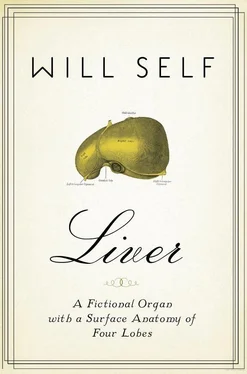In the still stiller middle of the night, when the television had dwindled to news and tombolas, Joyce finally read Isobel’s letter. It was only the orphaned wail she’d expected; the ‘you don’t understands’, ‘it’s so hard for mes’ and ‘if only Daddy were still alives’. Of course, the ostensible cause of all these histrionics was her own dying state — Quid sum miser tunc dicturus? — and yet Isobel had abandoned her. She didn’t say where she had gone, whether Birmingham, London or that villa in Majorca belonging to a useless rich friend — one of her favourite bolt holes . There was only silly omniscience; Isobel wrote that she would be ‘watching out’ for her mother, that, despite having checked out, she would be ‘checking to see that you’re all right’. Really, Joyce thought, if it weren’t so pitiful it might be mystifying.
Over the next three days, Joyce called on the bellboy’s services often. He brought her snacks and, while she lounged in a bathrobe with Widder across its left breast, took her clothes away to be laundered. His name, Karl, was also embroidered on his left breast. Joyce tried her seized-up German on Karl, but he blanked this: his English was fine.
There was no call from Isobel. It had been agreed that it would be best if she went back to Birmingham immediately after Joyce died. There was no requirement for her to participate in her mother’s cremation, then the filing away of her dust — that could be left to the professionals . Isobel was needed for amateurish tasks: sorting stuff into boxes, humping some to charity shops, then asking Joyce’s friends if they wanted to ‘choose something’ from the superior residuum, that in a few years’ time their own friends would be asked to choose.
Late on the Friday evening Joyce called her home number and listened to the phone ringing in her own empty house. As it rang, she pictured the interior of the fridge, empty except for non-perishables: chutneys that wouldn’t die and low-fat spreads awaiting Judgement Day.
The undertakers had been recommended by Dr Hohl’s organization. Joyce called them on the Thursday morning — twenty-four hours after her reprieve — and their response had been as dispassionate as Hohl’s: her deposit was non-refundable, as was the one for the columbarium niche at Fluntern Cemetery. Both orders could, however, be reactivated when necessary.
Joyce had let the phone ring in her own house for a long while, half convinced that Isobel was hiding from her mother, crouching in the walk-in cupboard in her parents’ bedroom, her small shoulders shaking between polythene-sheathed dresses, her Start-rite feet planted between rows of shoes, all stretched by shoe trees. This was where Izzy had secreted herself when she was a little girl and evading elocution lessons or piano practice; but the phone only trilled on, duetting with the dunked-biscuit contralto of the Radio 4 continuity announcer, which had been left on to simulate the departed householder.
At long last Joyce had replaced the handset and gone back to the TV, which broadcast a succession of films — Rebecca, National Velvet, It’s a Wonderful Life — that were a reassuring background to her resurrection. For, while to begin with Joyce was able to persuade herself that the numbness was due to her under-dose, by Thursday evening, when she felt hungrier than she had been in months, there was no denying that change was under way.
She didn’t feel particularly well — how could that have been? But she wasn’t not well: this dullness of body and mind was wholly unfamiliar, a state of suspension. There was no medication for her to take, yet she remained continent. On Sunday morning, when she put on her clean underwear and stood in her slip in front of the biggest of the many mirrors, Joyce was jolted from her inertia by the sight of her own flesh.
Which was no longer jaundiced. It sagged, certainly, but only in the way expected of an older woman who had once been rangy, with beautiful high-rising breasts — these last, Derry’s words, not her own vanity. And while for two decades, the jibe between white lace and pleated skin had struck Joyce as the worst turn-off of all, she now found herself turning a little this way and a little that to admire the new-old birthday suit.
After four days of reclusion, the lobby was an alien planet. Floating from the lift to the reception desk, Joyce marvelled at the miraculous bubble-worlds of other people: an American mulling over a tourist map with his wife, a squat black maid struggling with an industrial vacuum cleaner.
With her cream blouse, neat brown tweed suit and her good coat from the new Selfridges in the Bull Ring — fake-fur trim, unlike the Inverness worn by the odd man she’d encountered outside the chapel — Joyce looked, she thought, perfectly nice . Around her neck was a heavy Victorian gold chain, given to her by Derry for their fortieth anniversary. Perhaps a little premature, but. he had said, presciently.
She placed her lilac carpet bag on top of the desk. Embroidered with gold fleur-de-lys, it was possibly too young for Joyce, but it was exactly the right size. Once the bill had chattered from the printer, it chewed Joyce up. Of course, there was Isobel’s added on — including many and pricey spirits miniatures — but her own snacks, teas and laundry were also, in the normal course of life, prohibitively expensive . She did well to hide her consternation, giving away only her Visa card.
‘You are wanting a taxi to the airport?’ the receptionist asked, and, when Joyce denied this, she suggested instead: ‘The Hauptbahnhof — the train station, maybe?’
‘No.’ Joyce shut the clasp of her bag with a definitive click. ‘Thank you, I’ll walk. It’s’ — she glanced at the revolving door which spun sunlight into the lobby — ‘a lovely day.’ She made to leave, then stopped. ‘You wouldn’t happen to know how to get to the Catholic church — St Andrew’s I think it’s called?’
‘St Anton’s,’ the receptionist corrected her, ‘on the Miner-vastrasse.’
At first hesitantly, then with increasing confidence, Joyce made her way down through the cobbled streets of the old town, then across the Münster Bridge. The fresh air was heady, and when, to the south-east, at the far end of the cobalt-blue lake, she saw the seven snowy peaks of the Churfistern, she gasped, then stood at the balustrade for several minutes, drunk with their loveliness .
It was only ten minutes’ walk to the church; the tramp down Seefeldstrasse, between dull five-storey houses and apartment blocks, wearied her, but Joyce got there feeling all right — not nauseous. She hadn’t thought ahead, and was oddly disappointed to realize she’d arrived at the end of a service. Father Grappelli was standing on the front steps, together with an older priest. Both wore snowy-white modern vestments, and long scarves embroidered with naive standard-bearing lambs. Joyce — despite not being a believer — thought the scarves demeaning of their office.
The priests were chatting with their parishioners: prosperous families of burghers — the adults had the self-satisfied expressions of the recently shriven. Joyce scanned the throng for the otter-headed man and his tight-faced friend, but was partially relieved not to see them. Then, affecting an interest in a plaque on the wall, she made her way along the side of the church. Here, she came upon the blockhouse of a 1960s vestry. The door was open, so she went in.
A teenage girl was bent over directly in front of Joyce, her long chestnut hair hanging down to the parquet floor, which was spread with newspaper. A woman of almost Joyce’s age — but plump, ruddy-faced, and squeezed into woeful jeans — was aiming a spray can at the silky cascade.
Читать дальше












